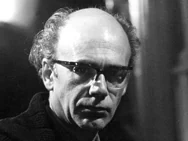The Lonely Passion of Judith Hearne
Cast & Crew
Jack Clayton
Maggie Smith
Bob Hoskins
Wendy Hiller
Alan Devlin
Peter Gilmore
Film Details
Technical Specs
Synopsis
Director

Jack Clayton
Cast

Maggie Smith
Bob Hoskins

Wendy Hiller
Alan Devlin
Peter Gilmore
Martina Stanley
Prunella Scales
Paddy Joyce
Dick Sullivan
Anna Murphy
Veronica Quilligan
Rudi Davies
Kate Binchy
Marjorie Hogan
Paul Boyle
Leonard Mcguire
Gerard O'hagan
Seamus Newham
Gemma Murphy
Isolde Cazelet
Mike Rennie
Ian Mcneice
Richard Taylor
James Holland
Aine Nimhuiri
Niall Buggy
Kevin Flood
Aidan Gillen
Frank Egerton
Sheila Reid
Catherine Cusack
Emma Jane Lavin
Alan Radcliffe
Marie Kean
Sue Hampson
Crew
Les Allett
Ron Allett
David Barron
Gillian Bates
Keith Batterbee
Susie Beavis
Mark Birmingham
Bob Blues
Francine Brown
Peter Browne
Graham Bullock
Lois Burwell
Bob Cann
Alan Chesters
Adam Cooper
Jim Cowan
Alistair Crocker
Gordon Davis
Georges Delerue
Eddie Dougall
Trevor Dyer
John Fields
Mark Fisher
Jim Foran
Bert Gadsden
Jon Gardey
Patrick Gleeson
Joe Goodman
Liz Green
Ken Groom
Tim Grover
Brendan Gunn
Peter Hannan
Henry Harris
George Harrison
Bob Hathaway
Bruno Heller
Jacky Holding
Michael Holdings
Sarah Horton
Charles Hubbard
Charles Ireland
John Ireland
Ken Jackson
Elton John
Richard Johnson
David 'ned' Kelly
Irene Lamb
Nick Laws
Terry Lee
Ken Lintott
Brian Lofthouse
Lee Lighting Ltd
Josie Macavin
Larry Marchant
Brian Martin
Brian Moore
Brian Morris
David Murphy
Andy Nelson
Peter Nelson
Peter Nelson
Maurice Newsome
Denis O'brien
Grania O'shannon
Steve Payne
Alan Perez
Michael Pickwoad
Jill Quertier
Luke Quigley
Terry Rawlings
Larry Shay
Jeanie Sims
Bob Smith
Bobbie Smith
John Stanborough
Stefan Stankowski
Brian Sullivan
Rob Sutton
Terry Tapping
Eric Tomlinson
Ann Townsend
Tony Tromp
John Turner
Elizabeth Waller
Adam Walton
Brian Webb
Rick Wentworth
Gary White
Gordon White
Dennis Wilson
Kirsten Wing
Paul Wood
Film Details
Technical Specs
Articles
Wendy Hiller, 1912-2003
Wendy Hiller was born on August 15, 1912, in Bramhall, and raised in Manchester, where her father was a cotton-cloth manufacturer. Educated at Winceby House, a girl's school in Sussex, Hiller found herself drawn to the theater, and after completing secondary school, Wendy joined the Manchester Repertory Theater, where she was a bit player and later an assistant stage manager. In 1934, she earned critical acclaim and stardom when Manchester Rep cast her as the lead in the popular drama, Love on the Dole, written by her future husband, Ronald Gow. The play was such a hit, that Hiller would repeat her role in London and triumphed on Broadway.
Back on the London stage, she was playing the lead in George Bernard Shaw's St. Joan, when she caught the eye of the playwright himself. He cast her as the beloved cockney flower girl Eliza Doolittle in Pygmalion (contemporary audiences will no doubt be aware of the musical version - My Fair Lady) on stage in 1936 and in Anthony Asquith's screen adaptation two years later co-starring Leslie Howard. The film was a smash, and Hiller earned an Academy Award nomination for her striking and original Eliza. Shaw would cast her again as an heiress turned Salvation Army worker in the classic Major Barbara for both stage and the 1941 film version.
The ensuing years could very well have been Hiller's time for screen stardom, yet despite her blazing acting ability, regal presence and distinctive voice, her film forays were too few, as she concentrated on the stage and spending time with her husband Gow and two children. Still, when she did make a film appearance, it was often memorable: a materialist turned romantic in Michael Powell and Emeric Pressburger's glorious, I Know Where I'm Going! (1945); a lonely hotelkeeper in Delbert Mann's Separate Tables (1958), which earned her an Academy Award as best supporting actress; an obsessive mother in Jack Cardiff's Sons and Lovers (1960); a unfaltering wife to Sir Thomas More in Fred Zinneman's brilliant A Man for All Seasons (1966); and as a compassionate nurse who cares for the deformed David Merrick in David Lynch's The Elephant Man (1980).
Ill health became an issue for Hiller in her later years, but she made one elegant return to the camera when she was cast as a former society beauty who is interviewed 50 years after her fame in Moira Armstrong's The Countess Alice (1992). In a performance that was touching, but never maudlin, Wendy Hiller proved that few could match her for presence, integrity and dignity. Her contribution to her craft did not go unnoticed, as she was made a Dame of the British Empire in 1975. She is survived by her son, Anthony, and daughter, Ann.
by Michael T. Toole

Wendy Hiller, 1912-2003
Quotes
Trivia
Miscellaneous Notes
Released in United States Winter December 23, 1987
Wide Release in United States February 5, 1988
Released in United States on Video October 12, 1988
Released in United States 1988
Shown at Dublin Film Festival October 26-November 4, 1988.
Began shooting May 11, 1987.
Film is in memory of Ramon Gow, who died during its production.
Wide Release in United States February 5, 1988
Released in United States on Video October 12, 1988
Released in United States 1988 (Shown at Dublin Film Festival October 26-November 4, 1988.)
Released in United States Winter December 23, 1987













